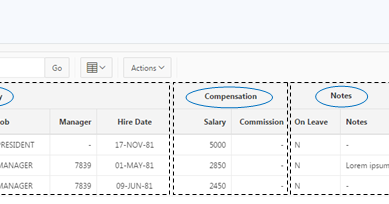
FIRST _VALUE is an analytic function. It returns the first value in an ordered set of values. If the first value in the set is null, then the function returns NULL unless you specify IGNORE NULLS. This setting is useful for data densification.
Here are a few wrong and correct ways to do it. I want to use oracle syntax to select only row from table DUAL. How to Select Top 1rows in Oracle? How can I get just the first row in a result set.
To skip a specified number of rows, use OFFSET, e. Supported by newer versions of Oracle , PostgreSQL, MS SQL Server, Mimer SQL and DBetc. So if there could be multiple rows for parameter MOMENT_ITEM_NUMBER_TYPE, you could get different for each row. How do you get row count in SQL?
What is SQL INSERT statement? You use the FIRST_ROWS(n) hint in cases where you want the first number (n) of rows in the shortest possible time. For this SQL Select first row in each group example, We are going to use the below shown data The SQL ROW _NUMBER Function allows you to assign the rank number to each record present in a partition.
In this example, we show you how to. I return the first row of an ordered et without using a temp table or cursor? MIN_ ROW _TO_FETCH is set to the first row of the result set to fetch, so to get rows to 6 you would set this to 50.

The concept behind this scenario is that an end user with a Web browser has done a search and is waiting for the. It is imperative to return the first result page (and second page, and so on) as fast as possible. This can speed things up very considerably. In a query where I group by a fiel I would like to select the first values from a specific row.
I have using something like: select distinct a. Home Articles Misc Here. If you are new to analytic functions you should probably read this introduction to analytic functions first. Thus the first widget for each user_id will have row _number 1. In the outer subquery, we select only the rows with a row _number of 1. With a similar query, you could get the 2nd or 3rd or 10th rows instead. The following inner-N query selects all rows from the employees table but returns only the fifty- first through one-hundredth row.
For each row returned by a query, the ROWNUM pseudocolumn returns a number indicating the order in which Oracle selects the row from a table or set of joined rows. Issue was that if table B had rows my view would return duplicate rows and distinct could not be used since to_clob for varchar CASE statements were in use. Which Method To Limit the Number of Rows in Oracle is the Best?
I cannot see the real world use case where updating the first three records we happen to find at 1pm in the afternoon would be. Update top N row of a select. Transcript to Select Top Rows.
Welcome to another episode of Essential SQL Minute. Today, let’s learn how to retrieve the top or bottom of our result set. Here on the screen you can see that I have a result set or a query that’s going to pull back every salesperson from the vSalesPerson table.
SELECT that will return just the first row. I am not that informed when it comes to SQL statements. For example, what if I wanted to retrieve the first records from my query. There is the TOP keyword. Hi, First row , but first randomly or first in regard of something ? I think you need to define an order by clause to have really the first row with some criteria.

Just the first , but the solution given above not return the first row , but only one of the rows. SQL to return the first record in a group. The first approach is to use an embedded select. Hmmm you do not have any id on which the groups can be qualified.
So it would not be possible to get the first row of each group. You can however get the row with minimum or maximum emp_id or sss_no per group by using a self-join. DBMS_ SQL is a package supplied by Oracle Database to perform dynamic SQL operations.
When native dynamic SQL commands (EXECUTE IMMEDIATE and OPEN FOR) were added in Oracle8i, DBMS_ SQL became a method of last resort for dynamic SQL.
Geen opmerkingen:
Een reactie posten
Opmerking: Alleen leden van deze blog kunnen een reactie posten.